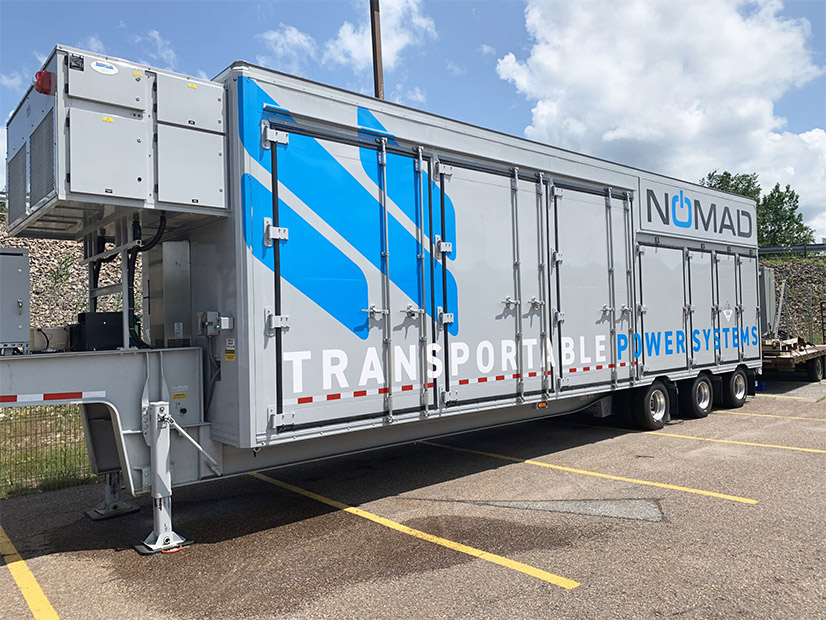Vermont’s largest electrical provider and a home-grown battery system manufacturer are expanding their fleet of portable utility-scale energy storage in the state.
Green Mountain Power and NOMAD Transportable Power Systems have been designated for a $9.5 million U.S. Department of Energy grant to create new resiliency zones in five Vermont communities with a history of power outages during extreme events.
GMP bought one of NOMAD’s 2-MWh trailer-mounted systems last year and the DOE grant will help pay for five more.
That first unit has been used for grid resilience since it arrived. It got its first field test last month during a planned outage near a manufacturer with round-the-clock operations.
“This was the first time we deployed it to benefit a customer,” GMP spokesperson Kristin Carlson told RTO Insider. “We had already been using it for load management. The NOMAD units are really a game-changer because they’re mobile.”
The utility already had trucks large enough to haul the NOMAD. So when it was time to upgrade the power lines near Twincraft Skincare in Colchester, GMP calculated Twincraft’s electrical load, moved the battery to the site and back-fed a transformer.
GMP then re-energized just enough of the area to power the manufacturing operations while the utility crew worked safely for six hours on the de-energized lines.
Images of Vermont were in the national eye just a few days later, as a slow-moving rainstorm inflicted epic flooding on many small towns.
But while such emergencies are one of the crises the NOMAD system is designed to meet, it was not needed this time.
“We were actually able to get people back online pretty quickly,” Carlson said.
That has not always been the case.
Vermont is the 43rd-smallest and 49th-most-populous state, and the residents are widely dispersed. Its hills and mountains can make for slow travel in severe weather.
Also, its grid is chopped into a patchwork of service areas. GMP, the state’s only investor-owned electric utility, serves more than 270,000 customers; two cooperatives and 14 municipal utilities power everyone else.
The federal grant is designed to demonstrate long-duration energy storage in military housing and in remote communities such as those in rural corners of Vermont.
Carlson said the NOMAD will be an important tool in building resilience in the face of climate change, but it’s just one of the tools GMP is using.
The utility is continually expanding its virtual power plant and energy storage network. It now stands at about 50 MW of utility-scale batteries, controllable EV chargers and 4,500 residential battery systems.
GMP has carried out pilot projects with vehicle-to-grid charging but is waiting for technology to evolve before integrating it on a wider scale.
NOMAD Transportable Power Systems is going to market with three models that it will fabricate in Waterbury, Vt. — the 1-MW/2-MWh Traveler that GMP has been using and two smaller models.
It recently sold its second unit, a spokesperson told RTO Insider, and is getting attention both for its adaptability and as an alternative to emergency diesel generators.
In carrying out the DOE grant, GMP and NOMAD will be joined by KORE Power, the lithium-ion battery cell and module manufacturer that launched NOMAD in 2020.
Electric reliability research organization EPRI will study the cost and reliability benefits of the project.
And in the process, GMP will create more of its Resiliency Zones, in which it combines backup batteries and local renewable power generation to limit outages in communities.




